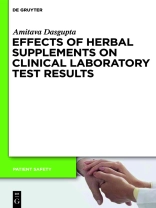Herbal supplements are available without prescription in many countries throughout the world and accounting for over $30 billion U.S dollar in sale. A majority of U.S population (25-40%) use herbal supplements while alternative medicines are major forms of therapy in third world countries used by as much as 80% population. Contrary to the popular belief that herbal remedies are safe and effective, many herbal supplements have known toxicity and unexpected laboratory test results may be the early indications of such toxicity. In addition, some herbal products such as St. John’s wort can interact with many Western drugs causing increased clearance of such drugs and hence treatment failure. This monograph would provide information on how herbal supplements affect laboratory test results thus patient’s safety. This monograph would provide a comprehensive and concise practical guide for laboratory professionals, physicians and other health care professionals. The emphasis of this monograph is to provide clinically relevant information rather than discussing in detail mechanisms of such effect, although brief explanations would be provided for such unexpected test results.
Cuprins
1. Commonly used herbal supplements
2. Abnormal liver function tests due to use of herbal supplements.
3. Kelp and thyroid panel
4. Interferences in digoxin immunoassays by various herbal supplements
5. Interaction of St. John’s wort with various drugs
6. Which herbs to avoid with warfarin therapy?
7. Interaction of ginseng, ginkgo, garlic and ginger supplements with various drugs
8. Interaction of various fruit juices with drugs
9. Heavy metal toxicity due to use of oriental and Ayurvedic medicines
10. Unexpected laboratory test results due to contamination of herbal supplements with Western drugs
11. Moderately toxic and dangerous herbs
Despre autor
Amitava Dasgupta, University of Texas Medical School, Houston, USA.












